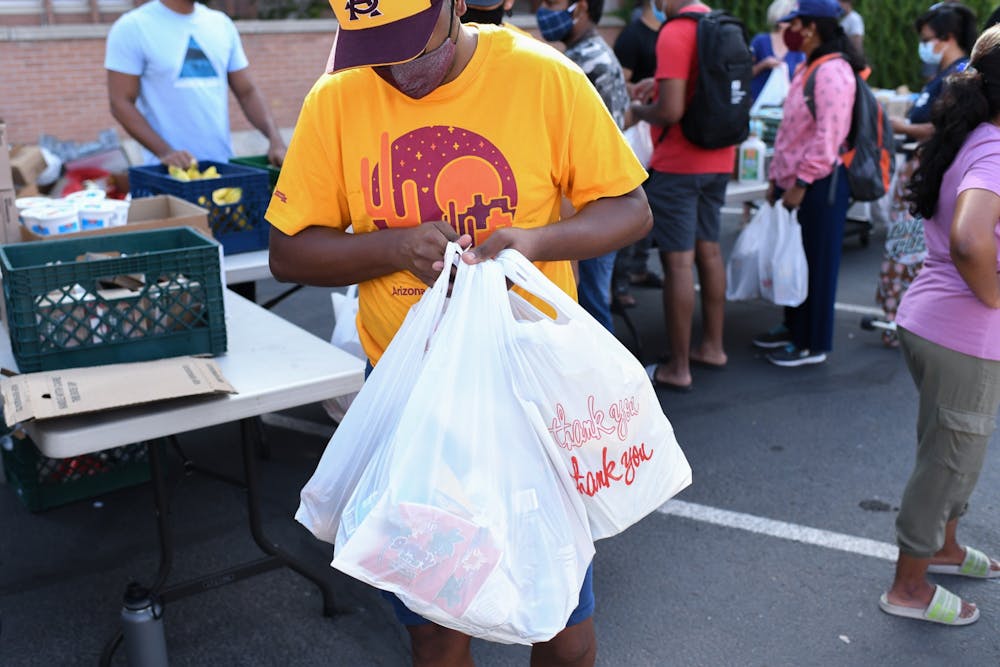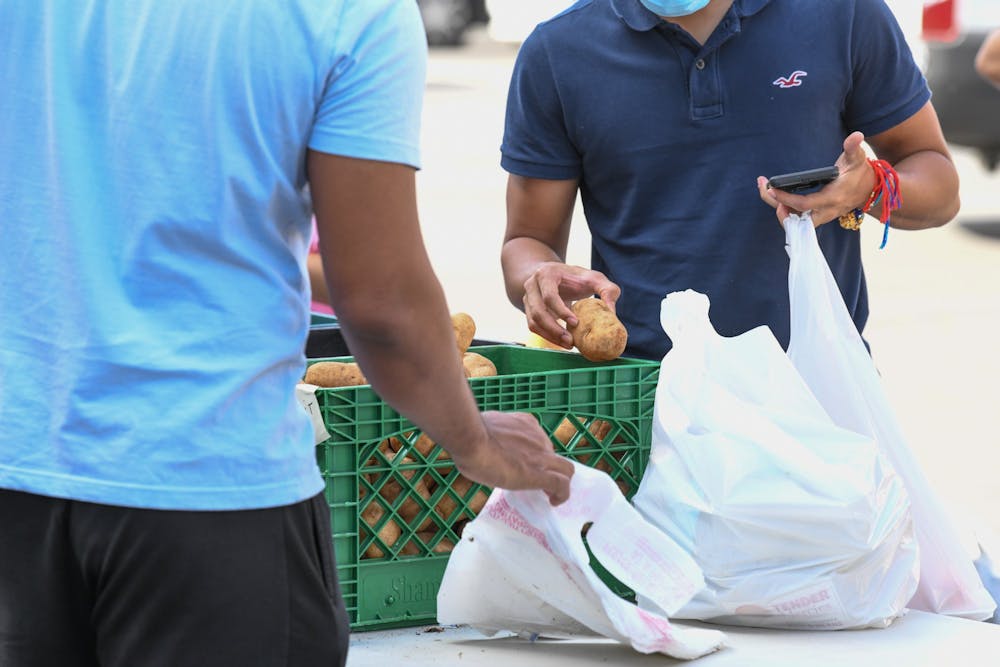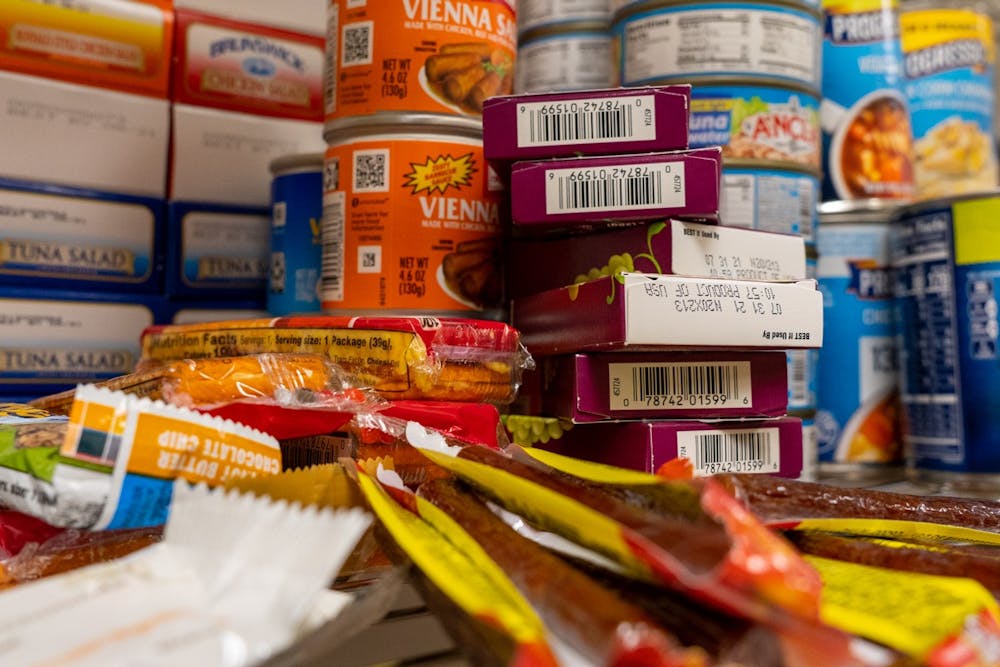ASU's University Senate and the student-led Pitchfork Pantry have worked separately and slowly — often without enough communication from administrators — for several semesters to support students who cannot get food, toiletries or fulfill other basic needs on their own.
Recent talks between leaders at the pantry and University officials to explore expanding access to services have failed, in part due to ASU's "innovative" view that the pantry doesn't go far enough.
Expansion of the pantry on campus seems unlikely for now.
Vice President of Student Services, Joanne Vogel said ASU's proximity to big cities gives students access to community resources the University feels it doesn't need to replicate. She did not point to any specific off-campus resources.
"The pantry isn't innovative," Vogel said. "What some schools do to feed hungry students are bigger and bolder ideas than a food pantry. Those are the ideas we want to put out in front of students to see if they're interested."
Pitchfork Pantry operates on all four campuses but has never had its own central headquarters. The organization's West and Polytechnic pantry services are on hiatus because the group lost its physical spaces and lacks the volunteers to regularly staff them. Leaders plan to schedule pop-ups soon, said Lindsay Pacheco, a senior in medical studies and director of Pitchfork Pantry on the Downtown Phoenix campus.
"We have been relentlessly fighting for a space. We have been diligently advocating for our students for the need of a food pantry in particular for a long time," said Nargish Patwoary, a graduate student studying biology and director for Pitchfork Pantry at the West campus.
Currently, the organization operates adjacent to the Tempe campus at First United Methodist Church. It operates out of two locations on the Downtown Phoenix campus – one on the ground floor of ASU Health South and a pop-up pantry located at the Lincoln Family Downtown YMCA hosted by St. Mary's Food Bank.
At the first pop-up pantry on the Tempe campus in August, 228 students received a box of food as well as other necessities.
"We live off campus but we don't have part-time jobs currently," said Vyshnavi Sri Datta Uppala, an international graduate student majoring in computer science at the August pop-up pantry. "We have just paid our admission fees, so we need a little bit more support."
Of the 228 students, 33% of them noted they either ate less than they should, couldn't afford to eat a balanced meal, cut the size of meals or were worried their food would run out before they had money to buy more.
Janelle Miguel, a sophomore majoring in civil engineering, said while she has a food budget, it depends on her work schedule. Miguel visited the pantry because she had been scheduled just twice in one week and knew the paycheck might be a little short.
Pitchfork Pantry launched in 2017 after a 2016 study, conducted by College of Health Solutions associate professor Meg Bruening, found over 30% of the University's freshmen who lived in residential halls had experienced food insecurity.
According to a 2019 survey from the Hope Center for College, Community, and Justice, an action research center advocating for university students' basic needs, 26% of ASU students struggle with low or very low food security.
University Senate passes supporting resolution
To address meeting basic needs, the University Senate, a body made up of tenured and tenure-eligible faculty, passed a resolution supporting and promoting food security last semester. Among other initiatives, the resolution expresses support for the establishment of a physical food pantry on each campus and the establishment of a basic needs coalition.
Though there has been slow movement in creating a basic needs coalition and establishing a physical food pantry with staff, Maureen McCoy, University Senate president-elect at the Downtown Phoenix campus, said the senate is committed to supporting students experiencing food insecurity and pursuing the resolution's nine initiatives.
However, McCoy said the ASU administration has not made efforts to take substantial action toward the resolution.
"What's the point of passing resolutions if something doesn't come from them?" said McCoy, who is a faculty adviser for Pitchfork Pantry. "By no means is it dead. We will continue working with University administration to solve this issue."
Generated with input from student constituent groups, the Council of Presidents has made basic needs investment and education the second pillar of its priorities for the academic year. Rather than a physical pantry space, students can expect to see more advertising for basic needs resources from the Associated Students of ASU, deans and advisers.
READ MORE: USG Council of Presidents release their priorities for 2021-2022 academic year
"As the lead for the Basic Needs Pillar on the Council of Presidents, I do understand the value that Pitchfork Pantry adds to the University," said Cecilia Alcantar-Chavez, Undergraduate Student Government Polytechnic president and junior studying engineering, in an email. "I would like to attest to the Dean of Students Offices' ability to provide holistic support to students. I have connected multiple peers and acquaintances with their office and I am so happy with the support that they received."
Last spring, the Graduate and Professional Student Association also passed resolutions to address food insecurity and create a dedicated pantry space, both of which McCoy co-sponsored.
"Without a physical space, it's difficult to carry out our mission and for students to know that the pantry is even a resource to them," said Patwoary, the West campus Pitchfork Pantry director.
McCoy said the sustainable solution would be to have a central location on the Tempe campus with additional physical spaces on every campus — something the University has yet to support.
Pantry leaders have also advocated for a full-time staff member to oversee operations, citing the difficulty in running a pantry with just volunteers.
"The pantry is student-led and student driven," Pacheco said. "It's good to have student faces there to help students feel more comfortable in accessing the resources, but it should be on ASU administration to run them."
Last year, the pantry was hosted at tutoring centers across all four campuses. Pacheco said this is an example of how, without a staff or central hub, delivering food becomes unsustainable.
Pacheco said the group would like to see "a fully ASU-supported, ASU-funded, ASU-run food pantry facility, just like there is one at NAU and UA."
Vogel said the University cannot accommodate a physical space and location for the more than 1,000 student organizations at ASU who want one.
Differing solutions
Vogel said the pantry has been helpful for the Educational Outreach and Student Services office by identifying students who need assistance. The Google Form to sign up to receive the pantry's goods asks students if they would like to receive additional help from ASU Student Advocacy and Assistance in applying for programs like the Supplemental Nutrition Assistance Program.
"The hope is that students will set up an appointment with the dean of students and student advocacy where we can offer a more personalized approach to see what the drivers and underlying causes are," Vogel said.
Pitchfork Pantry leaders organized a Google Drive folder of government resources students can use to familiarize themselves with available assistance. They can also make an appointment with the Student Advocacy and Assistance office to meet one-on-one to discuss personal issues, solutions or referrals to other University and community resources.
A different approach from providing food and other essential goods at a pantry is the reevaluation of a student's financial aid due to special circumstances such as job loss, income reduction or illness, Vogel said. Financial Aid and Scholarship Services reviews each student's case to determine eligibility for more federal funding.
Students can also apply for Student Emergency Funds through their own school which provides a one-time immediate financial assistance award, such as through the School of Social Transformation.
This process could take a few weeks, however, and Pitchfork Pantry leaders said the pantry is there as a necessary, short-term solution for people awaiting more secure financial situations.
"I understand that food distributions isn't the end of solving food insecurity, but short-term solutions help people right now," Pacheco said. "We think about the student who needs food today or this weekend and can't wait for a scholarship four or five months from now. Some of these student situations are temporary until they can find the right job or graduate and establish themselves as professionals."
Reach the reporters at nlam3@asu.edu and jkabiri@asu.edu and follow @_nancy_lam and @jasminekabiri on Twitter.
Like The State Press on Facebook and follow @statepress on Twitter.
Continue supporting student journalism and donate to The State Press today.

Jasmine Kabiri is the assignment editor at The State Press, overseeing and editing stories produced by the six digital desks. She has previously worked as a reporter at The Daily Camera and Cronkite News.






